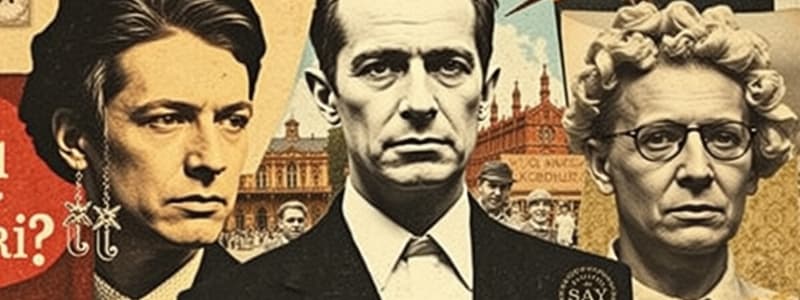Podcast
Questions and Answers
What is a key characteristic of leaders?
What is a key characteristic of leaders?
- They typically avoid making decisions.
- They prioritize maintaining the status quo.
- They work best in isolation.
- They can dictate or influence change. (correct)
Which of the following statements about leaders is true?
Which of the following statements about leaders is true?
- Leaders can inspire and motivate others. (correct)
- Leaders have no influence on outcomes.
- Leaders rely solely on group consensus.
- Leaders are always formally appointed.
In what way are leaders generally perceived?
In what way are leaders generally perceived?
- As people who resist change and innovation.
- As influential figures capable of enacting change. (correct)
- As individuals who prefer delegation over direct involvement.
- As those lacking vision or direction.
Which aspect is often associated with effective leadership?
Which aspect is often associated with effective leadership?
What role do leaders play in organizational change?
What role do leaders play in organizational change?
Study Notes
Characteristics of Leaders
- Effective leaders exhibit strong communication skills, enabling them to articulate vision and directives clearly.
- Emotional intelligence is essential, allowing leaders to understand and manage their own emotions and those of their team.
Truths about Leaders
- True leaders inspire trust and confidence among their followers, fostering a collaborative environment.
- Leaders often possess a clear understanding of their organization's goals, aligning team efforts accordingly.
Perception of Leaders
- Leaders are typically seen as visionaries who guide their teams towards achieving objectives.
- There is often a perception of leaders as role models, influencing behavior and setting standards for performance.
Aspects of Effective Leadership
- Decision-making capability is a critical component, as leaders must evaluate options and take calculated risks.
- Adaptability to change is frequently associated with successful leadership, impacting how organizations respond to challenges.
Role of Leaders in Organizational Change
- Leaders initiate and champion change, ensuring alignment with strategic goals while addressing resistance among team members.
- They serve as change agents, motivating and supporting employees through transitions to foster a positive organizational culture.
Studying That Suits You
Use AI to generate personalized quizzes and flashcards to suit your learning preferences.
Description
Assess your understanding of key characteristics and perceptions of leaders in organizational contexts. This quiz explores the essential traits of effective leadership and their influence on change within organizations. Delve into the significance of leadership roles and how they are perceived in various environments.




